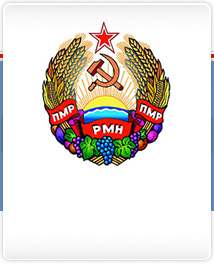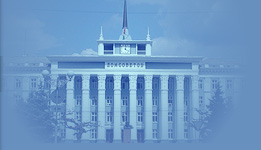Presidential Institution in the Pridnestrovian Moldavian Republic
At the initial stage of development of our republic the status of the head of the state and executive power were not determined in the statutes adopted by the parliament. It was necessary to create the legal basis for interaction of the executive branch with other branches. The problem was solved when the law “On the status of Chairman of PMSSR” was adopted (on March 5, 1991). The powers of Chairman of PMSSR were determined there:
1. protection of the sovereignty;
2. formation of the Government in coordination with the Supreme Soviet;
3. presentation of candidatures for the posts of Chief Judge of the Supreme, Constitutional courts and Arbitration, the post of Prosecutor of PMSSR and Chairman of the Committee on state control to be confirmed by the Supreme Soviet;
4. representation of the republic in international relations
5. settlement of the problem of citizenship
6. signing the laws;
7. adoption of edicts that can be disaffirmed within a fortnight after issuing
The liability of Chairman for violation of the Constitution and laws of the USSR and PMSSR was provided by the law. The Supreme Soviet of PMSSR had a right to impeach the Chairman if two thirds of deputies voted for it and the Committee of the Constitutional inspectorate of PMSSR approved it. The impeachment could be initiated by one thirds of the deputies of the Supreme Soviet of PMSSR or one fifths of electors.
On October 22, 1991 the office of Chairman of PMSSR was renamed the office of the President of PMSSR. His status was regulated by the Constitution (adopted in 1991); he had the same powers as the Chairman. He had the right to veto acts adopted by the executive power if they were contrary to the laws, to appoint heads of local administrations. Presidential elections were appointed on December 1, 1991. On October 22, 1991 the law “On Presidential elections” came into force. According to the law “the citizen of the republic under 65 and over 35 years old, eligible to vote and having good health for discharging presidential duties can be elected president of the republic”. The term of the office was fixed in the law; only two terms were allowed.
The presidential elections were appointed by the Supreme Soviet and were financed by the Republican budget and voluntary donations of people accumulated by the Central election commission and then evenly distributed among candidates. Direct or indirect participation of foreign organizations or citizens was prohibited.
As a result of elections on December 1, 1991 I.N. Smirnov became the President of the Pridnestrovian Moldavian Republic (65, 4% of electors voted for him)
The Constitution of the Pridnestrovian Moldavian Republic (1991) established the following powers of the President as head of the state:
- the President was a guarantor of observing the Constitution and laws of the USSR and the Pridnestrovian Moldavian Republic; human and civil rights and liberties irrespective of their nationality; he took necessary steps on protection of the sovereignty of the republic and its territorial integrity;
- the President represented the Pridnestrovian Moldavian Republic in inter-republican and international relations; carried out negotiations and signed inter-republican and international treaties and agreements; appointed and recalled representatives of the Pridnestrovian Moldavian Republic at international, business, cultural and other organizations, diplomatic representatives in foreign states; appointed and relieved plenipotentiaries of the President of the Pridnestrovian Moldavian Republic; administered a foreign policy; signed instruments of ratification; received letters of credence and recall of diplomats accredited to him.
- The President was at the head of the public authorities and provide interaction with supreme governing bodies of the Pridnestrovian Moldavian Republic;
- The President was at the head of the Council of Defence of the Pridnestrovian Moldavian Republic and he was Commander-in-Chief of the Armed forces of the Pridnestrovian Moldavian Republic; worked out and presented a military doctrine to the Supreme Soviet, awarded state rewards and military ranks.
The President had to present annual reports on situation in the republic to the Supreme Soviet and to inform deputies about the most important problems of foreign and home policy. He also had to present the structure of the government for approval by the Supreme Soviet of the Pridnestrovian Moldavian Republic. The government was formed and changes to its structure were made in coordination with the Supreme Soviet.
On the initiative of the Supreme Soviet, its Chairman, one of the chambers or not less than one thirds of deputies of the Pridnestrovian Moldavian Republic the Supreme Soviet had a right to listen to a presidential report on his activity;
- the President nominated candidatures for posts of Chief Judges of the Constitutional Court, the Supreme Court and Arbitration of the Pridnestrovian Moldavian Republic; also candidatures for posts of the Prosecutor and Chairman of the Committee on state control of the republic;
- the President appointed heads of local administrations;
- the President had a right to bring in a bill to the Supreme Soviet;
- the President signed laws of the Pridnestrovian Moldavian Republic and had a right to veto. The Supreme Soviet had a right to agree with the President or got over a veto by two thirds of votes;
- the President dealt with the problems of citizenship, gave a right of asylum according to the legislation, determined measures to keep public order, security and state system of the republic; if necessary he introduced the state of emergency at the request or by consent of local Soviets of people’s deputies of the Pridnestrovian Moldavian Republic;
- as a head of the executive power the President abolished acts of the executive bodies if they were contrary to the laws of the Pridnestrovian Moldavian Republic;
- at the same time the President discharged the duties of the Chairman of the Pridnestrovian Moldavian Republic.
On June 2, 1992 a new law “On the status of the President of the Pridnestrovian Moldavian Republic” was adopted. The procedure of getting over Presidential veto, a right of the President to establish provisional presidential government in areas under the state of emergency, the office terms and a procedure of dismissal were regulated by the following changes to that law (on March 15, 1994). The penalty for insult in public and slander was provided by the law “On protection of honour and dignity of the President” adopted on March 22, 1993.
On October 2, 1996 a new law “On presidential elections in the Pridnestrovian Moldavian Republic” was adopted. It contained provisions concerning presidential elections, order of taking office and an oath, empowering and assuming powers of the head of the state; provisions on the liability for violation of the suffrage. According to the constitutional law the right to propose somebody as candidate for the Presidential office belonged to action committees of people, election blocs and associations.
The election campaign was financed by the Republican budget. All the candidates for a post of the President had a right to organize their own election funds with a view to finance electioneering. The candidate received more than half of the total number of votes became the President.
On December 26, 1996 the presidential elections were held. I.N. Smirnov was elected the President for the second time (he received 71, 94 % of votes).
As a result of adoption of a new Constitution of the Pridnestrovian Moldavian Republic in 1995, the powers of the President on formation of the executive bodies and administering them were changed. According to the new Constitution the President presented the structure of the government for approval of the Supreme Soviet, but he formed the government by himself.
With the view of implementing the principle of power division the Supreme Soviet was deprived of a right to abolish the President’s edicts if they were contrary to laws. At the same time the President was obliged to issue edicts in accordance with the Constitution and laws of the Pridnestrovian Moldavian Republic. The Supreme Soviet was given a right to suspend president’s edicts till consideration at the court.
According to the Constitution of 1995 the President had a right to appoint a referendum on dissolution of the Supreme Soviet. The President was given powers of giving pardon instead of the Presidium of the Supreme Soviet.
The form of government and the status of the President were changed according to the constitutional law “On amending the Constitution of the Pridnestrovian Moldavian Republic” adopted on June 21, 2000. A new requirement to candidates for a post of a President was introduced: a person who has been a citizen of the Pridnestrovian Moldavian Republic for ten years; and who is still a citizen of the Pridnestrovian Moldavian Republic can become the President.




